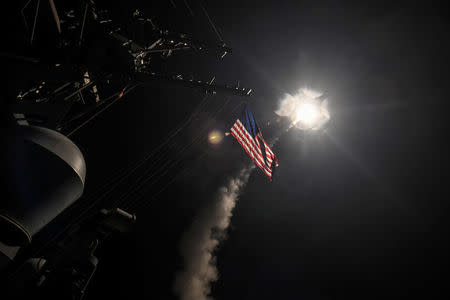For some Syrians in U.S., strikes turned Trump from villain to hero
By Steve Friess DEARBORN, Mich. (Reuters) - Syrian-Americans on Friday hailed the U.S. missile attack on a Syrian air base as a blow for human rights, but said they were wary of both President Donald Trump's motives and what comes next. Many who had been angered by Trump's efforts to ban Syrians, along with visitors from several other Muslim-majority nations, welcomed what they saw as his new role as the avenger of civilians killed in this week's chemical weapons attack. "We needed to take some action, show some backbone," said Judy Asghar, 35, an American born to Syrian immigrants who lives in Dearborn, Michigan, epicenter of one of the largest Arab-American communities in the United States. Some called Thursday night's military action overdue, voicing disappointment with then-President Barack Obama's refusal to attack the government of Syrian President Bashar al-Assad following a 2013 chemical weapons attack. "I was very glad that it finally happened, something that should have happened years ago," Ali Homsi, 59, a civil engineer who moved to the United States from Syria as a student in 1978, said in a telephone interview. Homsi lives in Tempe, Arizona, but still has family in Syria. Many highlighted the human rights abuses that have characterized the six-year civil war and what they see as the impunity of Assad's government and pro-Assad forces. "No one's been enforcing that up until yesterday," Shireen Jasser, a Houston social worker whose father immigrated to the United States from Syria, said by phone. "We're just thankful to President Trump for making this swift decision," said Jasser, president of her city's chapter of the Syrian American Council. The Washington-based group advocates "a free, democratic, and pluralistic Syria through American support." U.S. officials said the air base targeted on Thursday was the launching point for Tuesday's poison gas attack, which killed at least 70 people, many of them children. Some Syrian-Americans and Syrians in the United States said Trump's response to the chemical attack transformed him in their eyes. "A lot of Syrian-Americans are now cheering the president, are elated," said Dr. Mohammad Kabbesh, 45, a physician who grew up in Damascus but now lives in Sacramento, California, said by phone. Syrian refugee Motaz al Afandi, 49, of Texas said that if Trump pursues aggressive action toward Assad, he could end up solving the refugee problem. "If we get rid of Al-Assad, we won't need to be refugees anymore," said al Afandi, who runs a tow truck business in the Dallas area and sought asylum in the United States with his wife and three children after fleeing his country's conflict. Still, some who cheered the military action said the travel ban first launched in January had left them with mixed feelings about Trump, and they reserved judgment as they awaited his next steps. "We're partway there," said Youmun Alhlou, 23, of San Jose, California, who works as a legal specialist at Google and whose parents immigrated to the United States from Syria. Others questioned whether the White House was using the humanitarian crisis as an excuse for more overseas wars. "It's part of the plan to invade more countries for various reasons, whether its oil or power," said Amir Alshakarna, 31, of Southfield, Michigan, who became an American citizen last year and works for his family's construction company. "The Trump who did the travel ban, that's the real Trump." Asghar of Dearborn said Trump could be using military might to distract from the stumbles seen during his first months in office. Those include the failure to persuade Congress to repeal and replace Obamacare, legal challenges to Trump's travel ban and continuing investigations into alleged Russian meddling in the election, which Russia has denied, and into potential Trump associates' ties to Russia. "If this is all we do, it will mean very little except good politics for Trump," Asghar said. "Americans seem to love presidents who bomb people." (Additional reporting by Alex Dobuzinskis in Los Angeles, Tim McLaughlin in Chicago, Tom James in Seattle and Jim Forsyth in San Antonio; Writing by Barbara Goldberg; Editing by Daniel Wallis and Jonathan Oatis)

 Yahoo News
Yahoo News 

